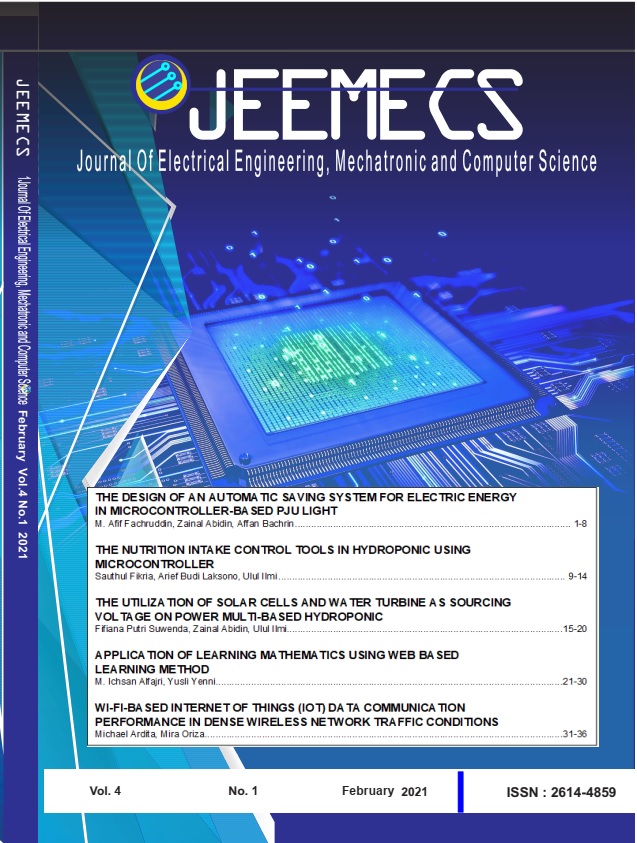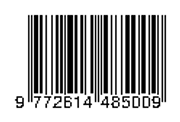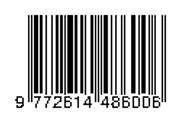THE UTILIZATION OF SOLAR CELLS AND WATER TURBINES AS SOURCING VOLTAGE ON POWER MULTI-BASED HYDROPONIC
DOI:
https://doi.org/10.26905/jeemecs.v4i1.4413Keywords:
solar panels, water turbines, batteries, and voltage sourcesAbstract
The use of electric power is significant to supply water pumps which are usually obtained from PLN electricity. The utilization of electricity from new renewable energy such as solar panel electricity and water turbines has not been used too much to cultivate hydroponic plants. Therefore, combining electric power (hybrid) between solar cells and water turbines is needed to supply electricity on hydroponic technology in conserving electrical energy for the future. Based on these problems, this study conducted various tests to create a design that could be used for energy use in hydroponic plants. The method used includes electrical and systematic design. The steps taken include the stage of literature study, designing, manufacturing hardware, integrating the system, and testing and analyzing the system. These theories can discover solar panels, solar chargers, battery endurance, thief joule circuits, and water turbines. This study uses several tests, including solar panels, solar chargers, battery endurance, thief joule series, and water turbines. Solar panels function to capture sunlight, solar chargers to store electrical voltage to batteries, battery endurance functions to find out how many batteries can store electricity, a series of thief joules to increase voltage, and water turbines to produce voltage. From all data tests, solar panels and water turbines are a source of voltage that the battery will store via a solar charger, and then from the battery, it will be supplied to the hydroponic circuit as a source of voltage.
Downloads
References
Mardiyono, Sugeng Ariyono, Endro Wasito, Slamet Handoko. 2018. Pemanfaatan Teknologi Konversi Energi Surya Untuk Hidroponik Pada Smp Alam Ar Ridho
Ima Maysha, Bambang Trisno, Hasbullah. 2013. Pemanfaatan Tenaga Surya Menggunakan Rancangan Panelsurya Berbasis Transistor 2n3055 Dan Thermoelectric Cooler
Achmad Alfi Gozali. 2016. Sistem Pengatur Sirkulasi Air Otomatis Metode Tanam Hidroponik Menggunakan Tenaga Surya
Ari Anugrah Rizki. 2018. Rancang Bangun Mini Mikro Hidro Sebagai Pembangkit Sederhana Dengan Pemanfaat Arus Air Kran Wudu Otomatis Menggunakan Metode Turbin Air Vertical
Dr. Richard A. M. 2017 Merancang Alat Pengaruh Material Monokristal Dan Polikristal Terhadap Karakteristik Sel Surya 20 Wp Dengan Tracking Sistem Dua Sumbu
Downloads
Additional Files
Published
Issue
Section
License
Our ethic statements are based on COPE’s Best Practice Guidelines for Journal Editors.
Publication decisions
The editor is responsible for deciding which of the articles submitted to the journal should be published.
The editor may be guided by the policies of the journal's editorial board and constrained by such legal requirements as shall then be in force regarding libel, copyright infringement and plagiarism. The editor may confer with other editors or reviewers in making this decision.
Fair play
An editor at any time evaluate manuscripts for their intellectual content without regard to race, gender, sexual orientation, religious belief, ethnic origin, citizenship, or political philosophy of the authors.
Confidentiality
The editor and any editorial staff must not disclose any information about a submitted manuscript to anyone other than the corresponding author, reviewers, potential reviewers, other editorial advisers, and the publisher, as appropriate.
Disclosure and conflicts of interest
Unpublished materials disclosed in a submitted manuscript must not be used in an editor's own research without the express written consent of the author.
Duties of Reviewers
Contribution to Editorial Decisions
Peer review assists the editor in making editorial decisions and through the editorial communications with the author may also assist the author in improving the paper.
Promptness
Any selected referee who feels unqualified to review the research reported in a manuscript or knows that its prompt review will be impossible should notify the editor and excuse himself from the review process.
Confidentiality
Any manuscripts received for review must be treated as confidential documents. They must not be shown to or discussed with others except as authorized by the editor.
Standards of Objectivity
Reviews should be conducted objectively. Personal criticism of the author is inappropriate. Referees should express their views clearly with supporting arguments.
Acknowledgement of Sources
Reviewers should identify relevant published work that has not been cited by the authors. Any statement that an observation, derivation, or argument had been previously reported should be accompanied by the relevant citation. A reviewer should also call to the editor's attention any substantial similarity or overlap between the manuscript under consideration and any other published paper of which they have personal knowledge.
Disclosure and Conflict of Interest
Privileged information or ideas obtained through peer review must be kept confidential and not used for personal advantage. Reviewers should not consider manuscripts in which they have conflicts of interest resulting from competitive, collaborative, or other relationships or connections with any of the authors, companies, or institutions connected to the papers.
Duties of Authors
Reporting standards
Authors of reports of original research should present an accurate account of the work performed as well as an objective discussion of its significance. Underlying data should be represented accurately in the paper. A paper should contain sufficient detail and references to permit others to replicate the work. Fraudulent or knowingly inaccurate statements constitute unethical behavior and are unacceptable.
Originality and Plagiarism
The authors should ensure that they have written entirely original works, and if the authors have used the work and/or words of others that this has been appropriately cited or quoted.
Multiple, Redundant or Concurrent Publication
An author should not in general publish manuscripts describing essentially the same research in more than one journal or primary publication. Submitting the same manuscript to more than one journal concurrently constitutes unethical publishing behaviour and is unacceptable.
Acknowledgement of Sources
Proper acknowledgment of the work of others must always be given. Authors should cite publications that have been influential in determining the nature of the reported work.
Authorship of the Paper
Authorship should be limited to those who have made a significant contribution to the conception, design, execution, or interpretation of the reported study. All those who have made significant contributions should be listed as co-authors. Where there are others who have participated in certain substantive aspects of the research project, they should be acknowledged or listed as contributors.
The corresponding author should ensure that all appropriate co-authors and no inappropriate co-authors are included on the paper, and that all co-authors have seen and approved the final version of the paper and have agreed to its submission for publication.
Disclosure and Conflicts of Interest
All authors should disclose in their manuscript any financial or other substantive conflict of interest that might be construed to influence the results or interpretation of their manuscript. All sources of financial support for the project should be disclosed.
Fundamental errors in published works
When an author discovers a significant error or inaccuracy in his/her own published work, it is the author’s obligation to promptly notify the journal editor or publisher and cooperate with the editor to retract or correct the paper.











